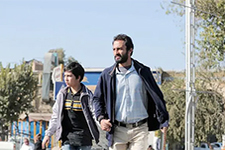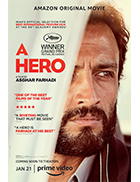A Hero (Ghahreman)
|  Like the films of Yasujiro Ozu or those of Jean-Pierre and Luc Dardenne, each of Iranian director Asghar Farhadi’s films is a variation on a distinct set of themes and stylistic devices. Since garnering significant international attention with his fifth feature film, A Separation (Jodaeiye Nader az Simin, 2011), which won a host of awards, including the Golden Bear at the Berlin Film Festival and the Oscar for Best Foreign Language Film, Farhadi has focused on tightly wound stories about a small set of characters engaged in a slowly escalating conflict in which everyone and no one is at fault. Farhadi’s films are both intimate psychological portraits of interpersonal conflict and sharply etched mysteries whose intertwining allows him to explore his characters in all their complicated messiness. He studiously avoids passing judgment or labeling his characters as heroes or villains and instead focuses on trying to understand them—who they are, why they do what they do. It is somewhat ironic, then, that his engrossing new film is titled A Hero (Ghahreman). If you have seen his previous films, including The Past (Le passé, 2013) and The Salesman (Forushande, 2017), you know that the hero referred to in the title will not be a straightforward character of unquestionable moral character or bravery or sacrifice. There may be some aspects of the character that could be considered heroic, but there will also likely be flaws and conflict, poor decisions and impulsive actions that work against his purposes and even his best interests. And that is precisely what we get in Rahim (Amir Jadidi), the film’s protagonist, who we first meet as he is leaving prison for a two-day furlough. He has been in prison because of his inability to pay a sizeable financial debt to Bahram (Mohsen Tanabandeh), a relative of his ex-wife who holds him responsible and refuses to withdraw his complaint and allow Rahim to go free (under Iranian law, debtors can be imprisoned until their debt is repaid or the creditor chooses to withdraw their complaint). Rahim claims to have access to 75,000 tomans that he can use toward paying off the 150,000 tomans he owes Bahram, but he is ambiguous about the nature of this money or where it is coming from, saying only that it is from a friend. As it turns out, the money is from a bag full of gold coins that his fiancée, Farkhondeh (Sahar Goldust), found at a bus stop. Rahim takes the coins to a dealer to get cash, but he ends up changing his mind and instead puts up flyers about the lost bag. A woman soon calls him at the prison and claims the bag. She is able to describe it exactly, and when she arrives at Rahim’s sister’s apartment to retrieve it, she tells a tear-stricken story of having to keep the coins secret from her abusive husband. She arrives and leaves via taxi and does not give her name or any other information about herself. When news gets out about Rahim’s actions—returning the bag rather than keeping it and enriching himself—a news station runs a story on him and he becomes a local celebrity—the “hero” of the title who becomes, via television and social media, a cause célèbre for both the prison wardens (who are eager for some good public relations) and a charity that pushes for Bahram to withdraw his complaint so Rahim can go free and resume his life, which includes fathering an adolescent son (Saleh Karimai) who suffers from a speech dysfunction (and whose addiction to gaming on his mobile phone is one of the film’s many indications of how screen culture is taking over Iran, as well). It seems simple enough—a good man imprisoned for a debt he can’t pay makes a selfless choice that would seem to call for forgiveness and redemption, but Bahram will not budge. He refuses to acknowledge Rahim as a hero and instead questions why everyone is so eager to label him as such. After all, he simply did the right thing, just as lots of people do all the time every day. What makes him so special? And then there is the problem of Rahim not being completely honest about the situation. Because his relationship with Farkhondeh is a secret, he cannot say that she is the one who actually found the bag initially, so he takes credit for the discovery, which lodges a kernel of mistruth in the foundation of his story that can only grow and metastasize and throw its shadow over him and everything he does. Thus, Farhadi sets up an almost impossible situation in which Rahim and Bahram have legitimate arguments for their position that are fundamentally incompatible, and the film subtly shifts the balance in one direction or the other. At times it seems like Rahim is a victim, which is underscored by his generally affable nature and lack of guile (Amir Jadidi’s performance is quite astute in this regard, as he makes Rahim imminently sympathetic while also suggesting that there might be dimensions to him that we don’t quite see). Bahram, on the other hand, is brash and angry, an easy businessman-villain in the mold of Mr. Thatcher or Mr. Potter or Ebenezer Scrooge. But, we can’t ignore the fact that some of his accusations about the constructed nature of Rahim’s heroism make sense (and his suggestion that Rahim’s meekness is a just an act lingers in our minds). And he has suffered because of Rahim’s inability to pay back the loan, including having to liquidate his daughter’s dowry. So—who is the victim, then? As with Farhadi’s previous films, A Hero is narratively and emotionally gripping, but without a lot of the accoutrements that other filmmakers rely on. There is no musical score to lead our emotions, and Farhadi and cinematographers Ali Ghazi and Arash Ramezani tend to keep the camerawork simple and unobtrusive, relying on handheld shots that convey immediacy, but without drawing attention to themselves. It is solid, provocative work that grinds its way under your skin, pulling you one direction and then in another without seeming to exert any effort, which may be Farhadi’s greatest cinematic skill. Copyright © 2021 James Kendrick Thoughts? E-mail James Kendrick All images copyright © Amazon Studios |
Overall Rating: 


 (3.5)
(3.5)


